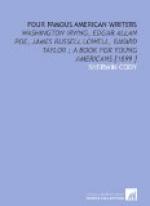You will remember that in one of his college letters, written while he was at Concord because rusticated, Lowell did not seem to care for Emerson. He afterward became his great admirer, and in this fable leads off with Emerson, saying:
There comes Emerson first, whose rich
words, every one,
Are like gold nails in temples to hang
trophies on,
Whose prose is grand verse, while his
verse, the Lord knows,
Is some of it pr—No, ’tis
not even prose.
Irving and Holmes are two more of his favorites. Of the first he says:
What! Irving? Thrice welcome,
warm heart and fine brain,
You bring back the happiest spirit from
Spain,
And the gravest sweet humor, that ever
were there
Since Cervantes met death in his gentle
despair.
Holmes he happily hits off thus:
There’s Holmes, who is matchless
among you for wit;
A Leyden jar always full charged, from
which flit
The electrical tingles of hit after hit.
His are just the fine hands, too, to weave
you a lyric
Full of fancy, fun, feeling, or spiced
with satiric;
In a measure so kindly, you doubt if the
toes
That are trodden upon are your own or
your foe’s.
And he ends by saying:
Nature fits all her children with something
to do;
He who would write and can’t write,
can surely review,
Can set up a small booth as critic and
sell us his
Petty conceit and his pettier jealousies.
Lowell was a good critic, and clearly saw the merit of the really great writers of his time. We have quoted his characterizations of those he admires. His keen thrusts at those who are not half as great as they would have us believe are both amusing and true, and no doubt made their victims smart sharply enough, for instance that—
One person whose portrait just gave the
least hint
Its original had a most horrible squint.
CHAPTER X
THE TRUEST POETRY
While Lowell was becoming famous indirectly as the anonymous author of the “Biglow Papers” and “A Fable for Critics,” he was writing and publishing over his own name sweet, simple lines that came straight from his heart and which will no doubt be remembered when the uncouth Yankee dialect of Hosea Biglow and the hard rhymes of the “Fable” are forgotten. The simpler a true poet is the more beautiful and really poetic he is likely to be. The simplest thing Lowell ever wrote was “The First Snow-Fall,” composed in 1847 after the death of his little daughter Blanche, with the sorrow for whose loss was mingled the joy at the coming of another child.
THE FIRST SNOW-FALL.
The snow had begun in the gloaming,
And busily all the night
Had been heaping field and highway
With a silence deep and white.
I stood and watched by the window
The noiseless work of the
sky,
And the sudden flurries of snow-birds,
Like brown leaves whirling
by.




